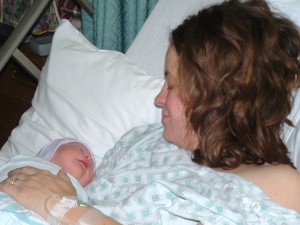 Yet one night, I realized in horror that my very own newborn was on Oxycodone.
Yet one night, I realized in horror that my very own newborn was on Oxycodone.
Sound highly unlikely?
Little Sister’s birth story
The end of my pregnancy with Little Sister was a strange one. I experienced postdronal labor (contractions that never led to active labor) on and off for an entire month. In my attempt to experience childbirth as naturally as possible, I stayed away from the hospital as I kept waiting for massive contractions to arrive. They never did. Finally, once I reached 42 weeks, I was induced. Even with Pitocin, I continued to labor without any pain medications and did fine all the way to 10 centimeters. At that point, my water broke and my obstetrician discovered it was as thick and green as pea soup, thanks to my baby’s meconium. When I couldn’t push at all and the baby’s head was not budging – much to everyone’s surprise she was transverse and never would have budged – I was rushed to an emergency Cesarean section. So much for a natural childbirth.
In an effort to save my daughter’s life and my own life over the next five hours (the baby was out quickly, but I had a long and complicated surgery and recovery process), I was given lots of drugs. And aside from the initial Pitocin, I had absolutely no idea what the medications were.
Once I could finally feel my extremities again, the pain set in. As other mothers who have experienced C-sections can attest, it felt exactly like someone had taken my insides out and put them back in again. Not at all pleasant.
An unwanted recovery
During my stay in the hospital, the nursing staff made sure I was up out of bed, walking, showering, and eating an unrestricted diet right away – things I later discovered aren’t always allowed with a C-section. They also encouraged taking as much pain medication as I wanted and were adamant about choosing between Morphine and Percocet, along with taking a large dose of Ibuprofin.
Even though I was sleep-deprived and felt awful, I was certain of one thing: I had NO idea what I was given in my spinal. And I had NO idea what was given to me in recovery. But it didn’t take a medical professional to figure out that if the medications were pretty powerful for me, they definitely affected my newborn. I knew those drugs had given me many unfavorable reactions, so even though I was in pain, I wanted to take as few pain medications as possible.
When I was offered the drugs, I asked if they were safe for breastfeeding. After being assured they were completely safe, I continued to exclusively breastfeed Little Sister and took several Percocet pills each day in the hospital. Once I got home, I didn’t take any Percocet.
The day after I got home, I noticed Little Sister was extremely lethargic. By evening, she was limp and hard to rouse. I decided to quickly look online to double check Percocet’s safety while breastfeeding, and was shocked to find that it’s a drug with two components: Acetaminophen and Oxycodone. Unknowingly, I was giving my newborn a powerful and addictive narcotic through my breastmilk.
With further research I discovered Percocet’s manufacturer does not recommend the drug for breastfeeding women, since Oxycodone is passed in breastmilk. Aside from causing addiction and withdrawal symptoms in newborns, the drug can create breathing and feeding problems, as well as excessive sleep. 1
Immediately, I decided to stop taking all pain medications. I definitely was in pain, but I was absolutely infuriated to discover what already passed through my breastmilk and desperately wanted to protect the health of my daughter.
What does this mean?
I’ve openly shared my story to encourage new mothers to be aware of what is going on with common birthing practices and procedures.
Similar to the medications used in epidurals, many painkillers used after childbirth are not tested on babies. Or, as in the case of Percocet, they are tested and proven to be harmful. Yet medical professionals administer them, anyway.
As much as exhausted and overwhelmed new moms may want to focus on the sleep-deprived newborn bliss and leave details to professionals, make sure to use your common sense. If something doesn’t seem right, don’t be afraid to ask questions and seek second opinions. If your gut is telling you something’s not right, it’s best to double, triple, and quadruple check until you’re satisfied. And, when breastfeeding, use medication only when absolutely necessary.
Do you know an expectant of first-time parent? Help them navigate the first year of feeding their baby with my eBook, First Bites: How To Instill Healthy Eating Habits During Your Baby’s First Year.
Sources
1. “Percocet and Breastfeeding.” Kristi Monson and Arthur Schoenstadt. eMedTV.
Latest posts by Hilary Kimes Bernstein (see all)
- The Day I Realized Healthy Choices Don’t Guarantee Health - July 21, 2015
- Avoid Synthetic Bug Sprays with All-Natural Repellents - July 16, 2015
- The Day I Learned I Could Cook Real Food - July 13, 2015
Wow! Did you ever say anything to the hospital? I would have complained.
I have found that doctors and even pharmacists are clueless about drugs, and about what gets transferred via breast milk.
I search up the topic percocets and breastmilk, because I thought my baby looked high. His eyes roll in his head, he is hard to rouse, it’s like he wants to wake up but he can’t keep his eyes open, he looked very lathargic. So I immediately stopped breastfeeding and put him on formula until the meds leave both of our system. I had a c-section 4 days ago and am still in pain, but I didn’t know that I was passing the narcotic on to my baby.